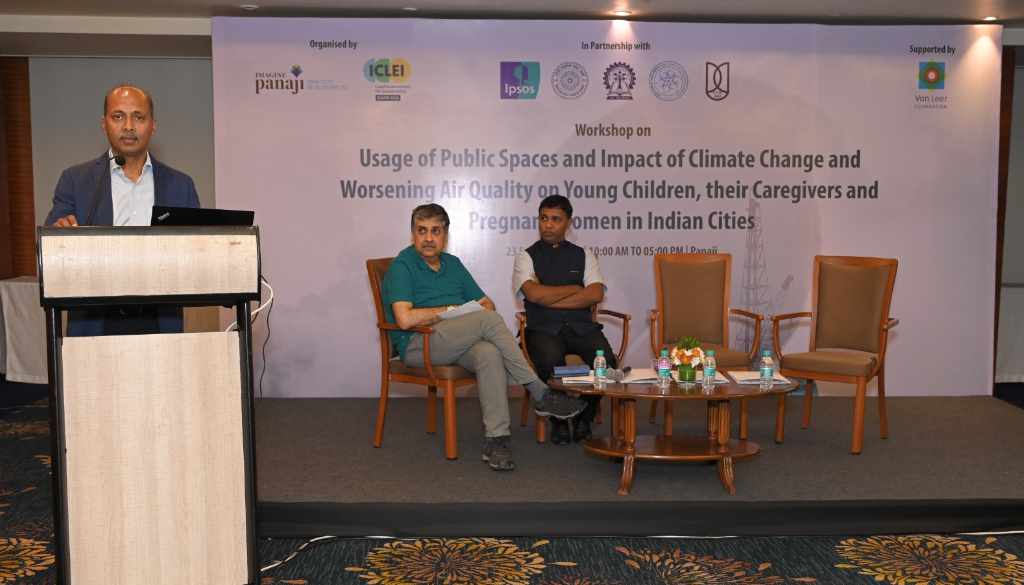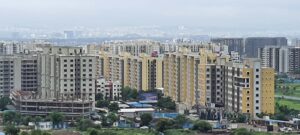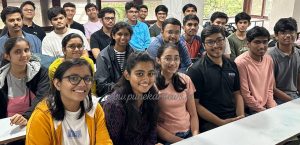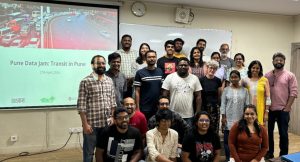Empowering the Future: Studies Call for Inclusive Urban Development to Protect Young Children and Families

Pune, February 23, 2024: Two compelling studies, presented at a workshop hosted by ICLEI South Asia and Imagine Panaji Smart City Development Limited in Panjim, Goa, on February 23, 2024, have called for a transformative shift towards inclusivity in city planning.
This is the first time such studies have been undertaken in India, highlighting the often overlooked needs of society’s most vulnerable—young children (aged 0 to 5), caregivers, and pregnant women. The research advocates for a comprehensive approach that safeguards these groups against the burgeoning threats of urban environmental hazards, especially in city planning and policies, paving the way for a more resilient and equitable future towards sustainability.
The two studies, carried out between January 2022 and December 2023, focused on ‘Young Children and Climate’* and ‘Usage of Public Spaces by Young Children, their Caregivers and Pregnant Women’**.
While the “Study on Young Children and Climate” (SYCC) was spearheaded by ICLEI South Asia along with Jawaharlal Nehru University (JNU), Indian Institute of Technology (IIT) Gandhinagar, IIT Kharagpur, and IIT Roorkee, the second study was conducted by ICLEI South Asia and Ipsos Research Pvt Ltd. Both studies have been supported by the Van Leer Foundation.
The pivotal workshop in Panjim on Friday was the fourth in a series, following the first three held in Guwahati, Kochi, and New Delhi, where stakeholders—including policymakers—converged to brainstorm solutions and recommendations for creating climate-resilient and child-friendly public spaces. Through working groups, technical presentations, shared experiences, and case studies, it’s been highlighted that young children, caregivers, and pregnant women, while not specifically targeted in city development, are often only considered as a subset of the wider population, underscoring a need for more focused policy inclusion.
The first study conducts an in-depth analysis in Delhi, Gandhinagar, Kharagpur, and Roorkee, focusing on the adverse effects of climate change and air pollution on young children (aged 0-5) and their caregivers, especially around early childhood development (ECD) sites. It stands out for its mixed-method approach, combining a review of existing data with extensive fieldwork to assess urban heat island effects, air pollution, and predict future climate impacts on these young children and caregivers. The study finds that while ECD sites offer some protection, they still subject children to considerable levels of pollutants and excessive heat, underlining the need for more robust climate-adaptive measures in urban planning.
The second study spans 18 diverse cities across India, using household surveys to understand how young children and their caregivers use urban public spaces. This geographically comprehensive study reveals that public spaces are not being used to their full potential by young children and their caregivers, due to various barriers that limit access and safety. The findings point to a clear need for urban environments to be more child-friendly and accessible, feeding into policy recommendations for initiatives like the Smart Cities Mission’s Nurturing Neighbourhoods Challenge, which seek to create healthier, more inclusive urban spaces for young families.
“Across all groups, the emotional, physiological, and psychological impacts are profound, signalling a critical need for tailored climate policies that protect these sensitive demographics in the face of growing urban environmental challenges,” said Emani Kumar, Executive Director, ICLEI South Asia, adding that the methodology for both studies has been thorough, encompassing the assessment of the urban heat island effect and forecasting the future implications of climate change on these vulnerable groups.
The studies outline actionable climate resilience strategies, such as:
– Enhancing urban greenery with sponge and sensory parks;
– Improving non-motorised transport to ECD sites;
– Reinforcing ECD infrastructure against climate threats;
– Circular waste management;
– Planting native flora around ECD sites;
– Setting up child-centric local councils and formulating climate-sensitive policies;
– Integrating climate awareness in the educational framework for preschools;
– Addressing climate-related health risks as a priority while providing support for health workers and high-quality antenatal care programmes (support systems for health workers such as ASHAs and Anganwadi workers).
A ‘Master checklist for Policymakers’ has been designed as a guiding framework to drive effective climate action for young children and caregivers in Indian cities. It emphasises three critical aspects:
Inclusivity and informed decision-making by prioritising marginalised young children and utilising quality research;
Equitable and science-based policy development that respects children’s rights and considers varying vulnerabilities; and,
A holistic, multisectoral approach ensuring comprehensive sector involvement and long-term accountability.
“Inspired by global best practices, this checklist aims at embedding a young children and caregivers’ perspective into urban climate policy-making,” said Kumar.
Friday’s workshop brought together government officials, urban planners, early childcare experts, policymakers, and community representatives to elucidate the pressing issue of climate change and its impact on these vulnerable groups (the studies cover a variety of income groups, genders and ages, among other parameters).
QUOTES
“Understanding children’s vulnerabilities are crucial when designing environments for them. This includes considering their physical vulnerabilities, such as health risks from pollution and climate-related phenomena, and psychological vulnerabilities, such as the impact of living in unsafe and unstable environments. For instance, children living on the streets or in precarious situations face enormous risks, often overlooked in city planning. We also need to rethink how we define and create child-friendly spaces, considering physical inclusivity for children with disabilities and other vulnerabilities,” said Peter Borges, Chairperson, Goa State Commission for Protection of Child Rights.
“Our efforts have to be multifaceted, encompassing collaborations with various sectors to enhance nutrition, protection, and education, and to ensure safe and healthy environments,focusing on the importance of embedding the needs of young children and their caregivers in urban planning. Recognising these unique challenges faced by children and their caregivers in urban settings, Van Leer Foundation is also focusing on the importance of nature and public spaces in child development,” said Ipshita Sinha, India Representative, Van Leer Foundation.
“By 2050, almost 70% of children would live in urban areas in India. This is a significant proportion and highlights the urgent need for child-compliant urban planning, public space design, and policymaking. These studies highlight a subject that is complex, encompassing social, economic, and political dimensions. I’m particularly interested in understanding the equity in our open spaces, considering all children and whether these spaces are universally accessible. Let us make tangible improvements, even if they seem small, such as enhancing the safety of parks. In Panaji, we’re committed to implementing these guidelines and showcasing them as successful examples for other cities. Let us walk the talk and emphasise the importance of action and implementation in creating better environments for our children.”, said Sanjit Rodrigues, Managing Director, Imagine Panaji Smart City Development Limited
* The Study on Young Children and Climate stands out for its dual approach: reviewing existing secondary data and gathering extensive primary data from four Indian cities – Delhi, Gandhinagar, Kharagpur and Roorkee. The study focused on the significant challenges of climate change and air pollution, particularly evaluating their impact on young children aged 0 to 5 and their caregivers, mainly around ECD sites. The study’s methodology is thorough, encompassing the assessment of the urban heat island effect and forecasting the future implications of climate change on these vulnerable groups
**The study Usage of Public Spaces by Young Children, their Caregivers and Pregnant Women was conducted in 18 cities, using household surveys by assessing and evaluating trends in utilising urban public spaces by young children and their caregivers. In order to make the study geographically representative, surveys were conducted in northern, southern, eastern, western, central and north-eastern cities of India, covering population sizes of all ranges i.e. greater than 40 lakh, between 10 lakh-40 lakh and less than 10 lakh. The identified cities for conducting the study included: Delhi, Chennai, Kolkata, Mumbai, Indore, Bangalore, Lucknow, Vijayawada, Raipur, Surat, Chandigarh, Guwahati, Jaipur, Shimla, Bhubaneshwar, Jhansi, Shillong and Dimapur.
About ICLEI South Asia
ICLEI South Asia is the South Asian arm of ICLEI – Local Governments for Sustainability, a global network of more than 2500 local and regional governments committed to sustainable urban development. Active in 100+ countries, we influence sustainability policy and drive local action for low-emission, nature-based, equitable, resilient, and circular development. ICLEI South Asia works to support cities on multiple aspects of sustainable development, in order to achieve tangible improvements in regional and global sustainability through local initiatives.
About Van Leer Foundation
VLF is an independent foundation working worldwide to inspire and inform large-scale action to improve the health and well-being of babies, toddlers and the people who care for them. It provides financial support and expertise to partners in government, civil society and business to help test and scale effective services for young children and families.
Contact








